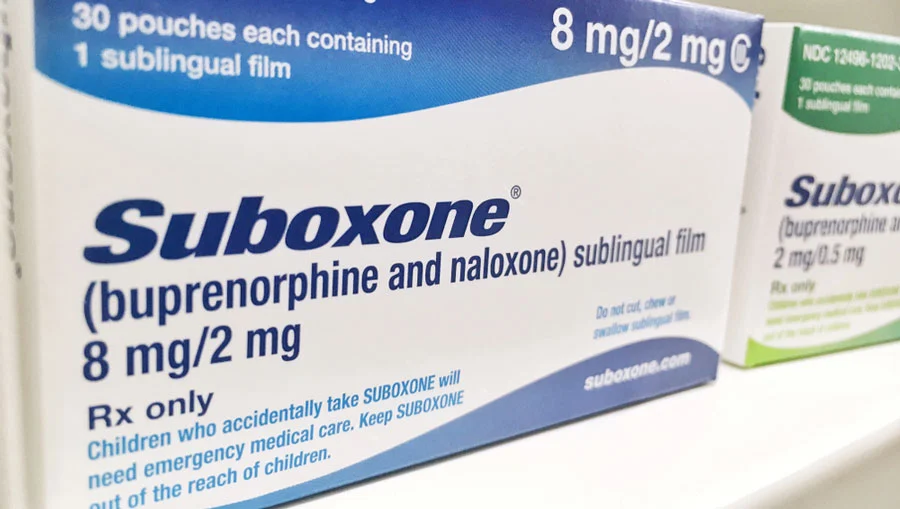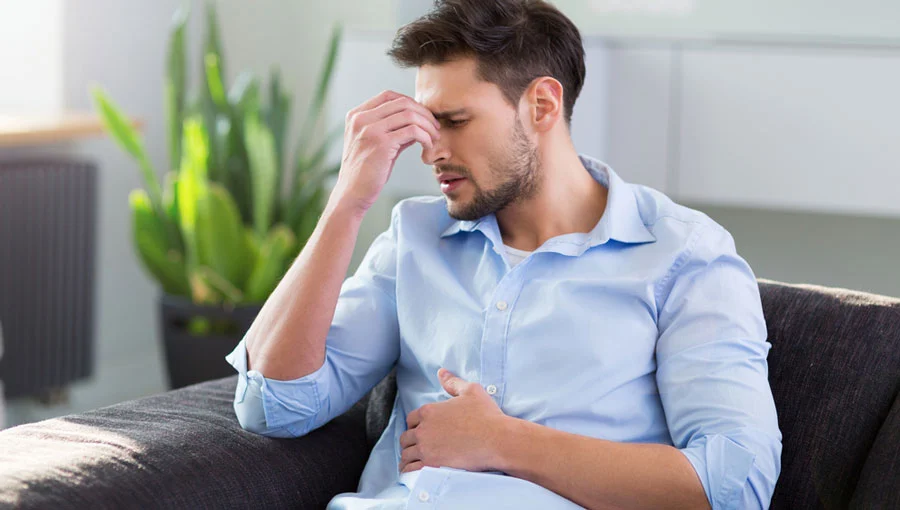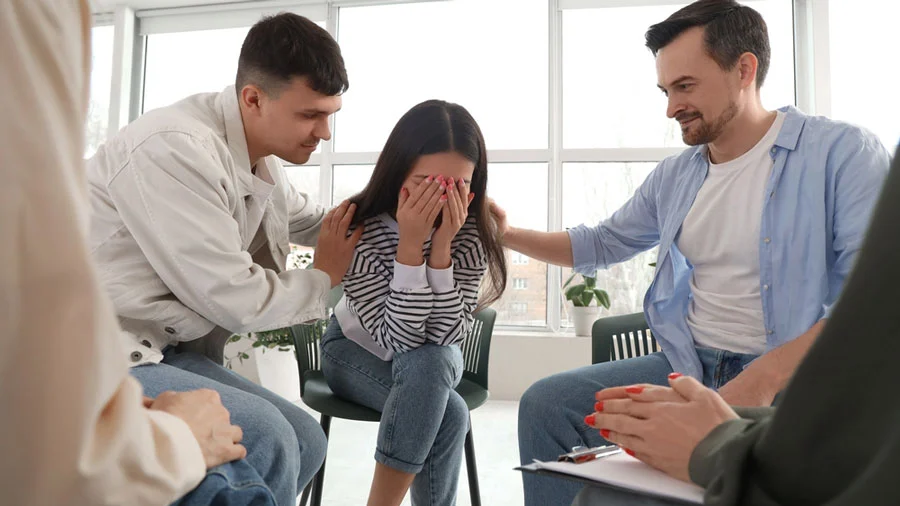Get Help to Overcome Withdrawals from Suboxone at South Shores
The first days after quitting Suboxone are the hardest. Symptoms like nausea, vomiting, chills, and headaches are intense and uncomfortable. You might feel uncomfortable and struggle to fall asleep, making it hard to find relief. But how long does Suboxone withdrawal last?
While the worst of the physical symptoms peak around three days, Suboxone withdrawal continues for 7-10 days. You’ll also experience mental symptoms later in the detox process, including irritability, depression, and extreme drug cravings.
You don’t have to go through this discomfort alone. At South Shores Detox and Recovery, we offer medical detox, tapered dosing for Suboxone, and support for overcoming opioid addiction. Keep reading to learn more about how we can help you.
Understanding Suboxone Withdrawal
Suboxone is commonly prescribed to treat opioid withdrawal. Its formula contains two types of addiction medicine; buprenorphine and naloxone.
The partial opioid agonist buprenorphine binds to the same receptors in the brain as opioids like heroin and painkillers. By binding to these opioid receptors, buprenorphine significantly relieves the symptoms of opioid withdrawal. It is an effective medication for treating opioid withdrawal according to the Substance Abuse and Mental Health Services Administration.
Since buprenorphine is not a full opioid agonist like prescription painkillers, heroin, or other opioids, it does not create the same sense of euphoria. You cannot get high on it to the same extent as opioids.
Its status as a partial opioid agonist makes the drug less addictive than opioids, as well as other types of addiction medication like methadone. It can be prescribed with or without other medications.
The medication naloxone is an opioid antagonist, meaning it blocks opioid receptors in the brain. This benefits people struggling with opioid use disorder because naloxone makes it harder to abuse other opioids when you’re trying to quit because they cannot activate opioid receptors.
Suboxone also releases medication over time, like a long-acting opioid. This makes it harder to abuse.
Physical Symptoms of Suboxone Withdrawal
Even though Suboxone is less addictive than full opioids, stopping them cold turkey causes intense physical withdrawal. The most common physical symptoms you’ll experience after your last dose wears off include:
- Headache
- Muscle aches and pains
- Fatigue
- Sweating
- Chills
- Fever
- Indigestion
- Digestive distress
- Nausea and vomiting
The physical symptoms of Suboxone withdrawal generally don’t last longer than 10-14 days. They are most intense for the first three days during the acute withdrawal phase.
Psychological Symptoms of Suboxone Withdrawal
Withdrawal also affects your mental and emotional health. The most common psychological symptoms associated with Suboxone withdrawal include:
- Irritability
- Troubles concentrating
- Intense drug cravings
- Insomnia or restlessness
- Mood swings
- Depression
- Anxiety
The psychological symptoms associated with Suboxone withdrawals can last a month, sometimes longer. Withdrawal symptoms often last longer when Suboxone is combined with alcohol or other drugs and in people with existing mental health conditions.
With the combination of low mood and drug cravings, it creates the perfect conditions for relapse. Receiving addiction treatment can help you overcome these cravings and continue down the road to long-term recovery.
How Long Do Suboxone Withdrawal Symptoms Last?
The intensity of Suboxone withdrawal symptoms can vary depending on factors like Suboxone use and dosage, overall health and hydration, and other substance use. Physical symptoms peak around 3 days and subside after a week or two. Psychological symptoms last 1 month or longer.
Suboxone Withdrawal Timeline
The amount of time after your last dosage before Suboxone withdrawal symptoms begin depends on factors like the dose and your metabolism. However, the effects are often felt for a full day. You may not experience withdrawal until the day after taking your last dose.
You’ll experience the most intense physical symptoms for the first 72 hours after Suboxone withdrawal symptoms start. Digestive issues, headaches, chills, and fever are most common. It might be hard to get comfortable or sleep.
As these subside, most people experience aching muscles, body aches, and pain. You may struggle with insomnia, irritability, and mood swings. General discomfort will continue but most physical symptoms subside after the first week.
You’ll likely still experience anxiety, depression, restlessness, and mood swings in weeks 2 and 3 of recovery. Most people experience intense drug cravings and continuing depression for several weeks.
Does Stopping Suboxone Put Me at Risk of Relapse?
There is a high rate of relapse in people struggling with opioid addiction. However, rates of relapse are significantly lower in people who use Suboxone as part of a comprehensive substance abuse treatment plan.
When you’ve put in the work to overcome drug addiction, you are less likely to relapse after stopping Suboxone. You’ll find yourself capable of managing life stress and cravings as they happen and comfortable with reaching out to your support system. You can identify when you’re at risk of a relapse and lead a life that supports long-term sobriety.
Outpatient addiction treatment is effective in some cases. However, inpatient treatment, combined with prolonged support and addiction medication, is considered one of the most effective ways to treat opioid addiction. Having support is especially important in the first year of recovery.
How to Cope with Withdrawal from Suboxone
Suboxone withdrawals are uncomfortable, first physically and then mentally. You can make this process easier by providing yourself with support, enrolling in a treatment program, and working with health professionals to monitor withdrawal symptoms.
Provide Your Body with Support
Staying hydrated is an important part of detox. Many people struggle with dehydration after long-term substance abuse and water also plays a big role in eliminating toxins like drugs and alcohol from your body.
When you can, sleeping is also a great way to promote recovery. However, you should not take medications or other drugs not prescribed by your doctor to help you sleep. These can hinder the detoxification process and make Suboxone withdrawal last longer.
You’ll also want to eat well when you want to eat again. Choose high-nutrition foods like fruits, vegetables, protein, and fiber. Long-term addiction often causes nutrient deficiencies. There’s even research that proper nutrition can reduce drug cravings.
Consider Tapered Dosing
Tapered dosing is sometimes recommended as part of the detox process. You’ll be monitored by a medical professional who will slowly reduce your dose of Suboxone over time.
By slowly reducing Suboxone levels instead of quitting cold turkey, your body is better able to adjust to lower doses. This reduces the risk of withdrawal symptoms and makes quitting Suboxone easier. It’s important to go through tapering under medical supervision.
Medications for Suboxone Withdrawal
Suboxone isn’t the best fit for everyone. Alternative medication-assisted treatments sometimes prescribed to ease withdrawal symptoms and combat opioid addiction include:
- Buprenorphine
- Methadone
- Clonidine
- Lofexidine
Remember that using prescription medication for addiction treatment can ease withdrawal symptoms but it isn’t a permanent solution. You or your loved one must also seek treatment to learn the skills necessary to overcome opioid addiction. Without established treatment goals, structure, and support, it’s likely you’ll fall into the cycle of addiction again.
Enroll in a Treatment Program
Breaking free from your physical dependence on opioids is only the first step. Many people who go through medical detox without also attending an addiction treatment program are significantly more likely to relapse. This is why we recommend medical detox while attending inpatient rehab.
An addiction treatment program is going to build a strong foundation of skills and support that will help prevent relapse in the future. At South Shores, we offer inpatient and outpatient rehab programs using evidence-based therapies and a holistic approach.
Some elements of rehab at our treatment center include group therapy, nutritional support, and various enrichment activities like surf, art, and music therapy, meditation, and yoga. These activities let you explore your interests outside of addiction and possibly develop hobbies to fill your time after you complete rehab.
You’ll also work closely with an individual therapist, giving you an opportunity to explore addiction, its root causes, and how it has impacted your life. Therapy might involve evidence-based approaches like motivational interviewing or cognitive behavioral therapy. This is also where you’ll identify stress, triggers, and obstacles to sobriety and how to overcome them.
South Shores also offers dual diagnosis treatment for clients struggling with co-occurring substance abuse and mental health disorders. You cannot treat addiction without also addressing underlying trauma or mental health conditions. Otherwise, there is a higher risk of relapse when symptoms flare up again.
Establish Support for Getting Clean and Sober
Addiction is a lifelong illness and having support is an essential part of relapse prevention. Even the most motivated individuals struggle during the recovery process. There will be times when you experience intense cravings or when you think it won’t hurt to do it “just once.”
These are the times you need to reach out for help. This could mean reaching out to friends or family, talking to a therapist or trusted support person, or attending a meeting with a support group.
Remember that cravings are a normal part of recovery and that you do not have to give in to them. Stick to your routine, continue getting enough sleep, and keep yourself busy with healthy hobbies during your free time.
Get Help for Opioid Dependence at South Shores
Taking Suboxone can offer relief from some of the more intense withdrawal symptoms, while also discouraging opioid abuse. Even something intended to help, however, has the potential for dependence and the need for support to quit.
If you are struggling with opioids or Suboxone addiction, reach out to South Shores Recovery. We can verify your insurance over the phone, answer any questions you may have, and start discussing a customized treatment plan that fits your needs and budget.
Our serene location is the perfect place for a new start. Whether you are in the early stages of addiction recovery, have already started medication-assisted treatment and need support, or are struggling in the recovery process, we are here to help. Call us today.
References
- https://www.ncbi.nlm.nih.gov/pmc/articles/PMC5688890/
- https://www.jsatjournal.com/article/S0740-5472(16)30513-X/fulltext
- https://nida.nih.gov/research-topics/opioids/medications-opioid-overdose-withdrawal-addiction-infographic
- https://extension.usu.edu/heart/research/diet-nutriton-and-substance-use-disorder





